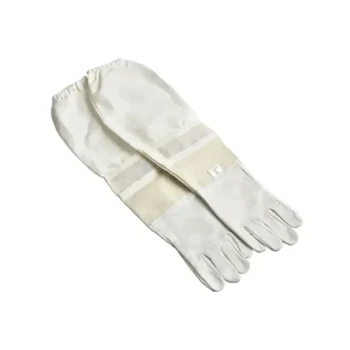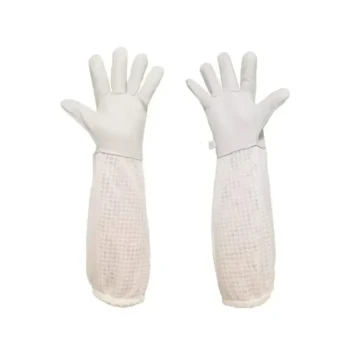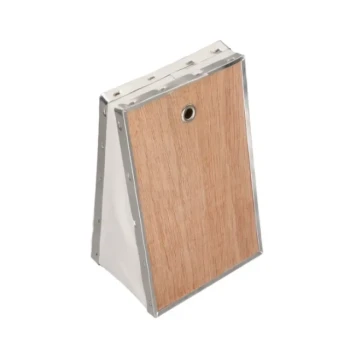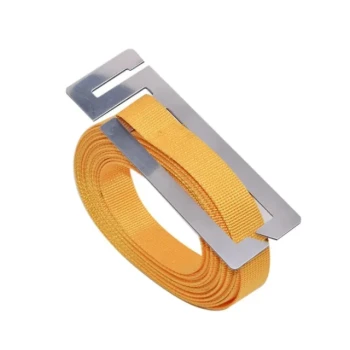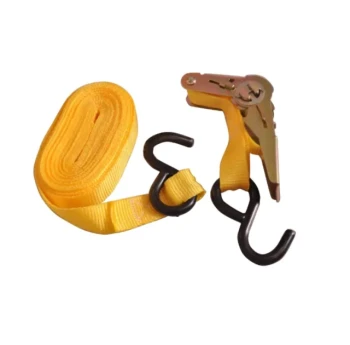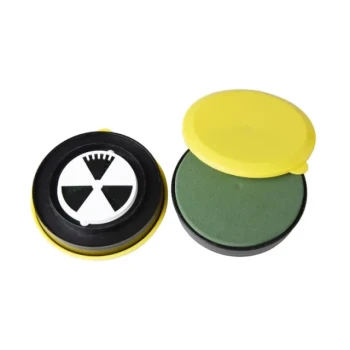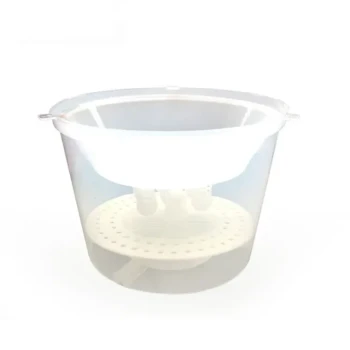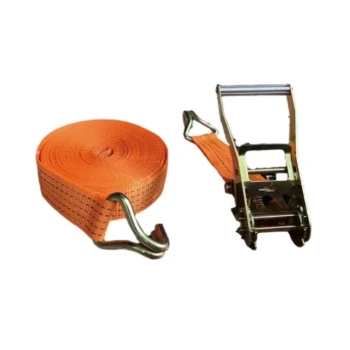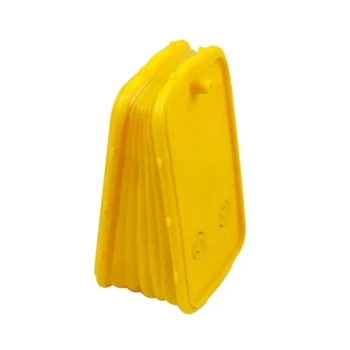In short, no. You should avoid using standard household cleaning products on your beekeeping gloves. These cleaners often contain harsh chemicals, bleach, or strong fragrances that can damage the material, particularly leather, and leave behind scents that may agitate your bees.
The primary goal when cleaning beekeeping gloves is not to make them look new, but to maintain their protective integrity and hygiene without introducing foreign elements that could harm the gloves or disturb your hive.
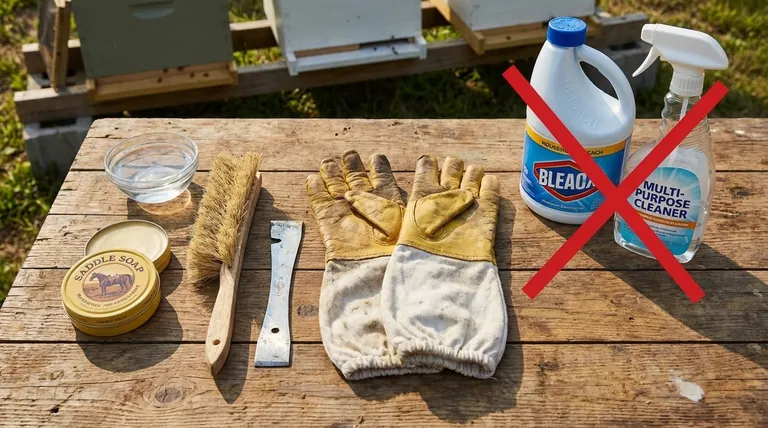
Why Standard Cleaning Methods Fail
Understanding why common cleaning techniques are unsuitable is the first step toward proper glove maintenance. The wrong method can do more harm than good, compromising both your safety and the bees' temperament.
The Problem with Chemical Cleaners
Household detergents and bleach are formulated to break down organic stains and kill germs aggressively. When applied to leather, these chemicals strip away natural oils, causing the material to become brittle, cracked, and stiff.
Furthermore, these products leave behind a strong chemical residue and scent. Bees navigate their world through scent, and any foreign smell can be perceived as a threat, potentially triggering a defensive response.
The Dangers of Machine Washing
Using a washing machine is equally damaging, especially for leather gloves. The combination of prolonged soaking and the mechanical agitation of a wash cycle will cause leather to shrink, deform, and lose its protective qualities.
Even for synthetic gloves, a machine wash can degrade seams and coatings over time, reducing their lifespan and effectiveness.
The Impact of Scent on a Hive
A beehive is a complex environment governed by pheromones. Your gloves inevitably pick up the scent of the hive, including queen pheromones and alarm pheromones.
Introducing a foreign, powerful scent from a laundry detergent or cleaner masks these natural cues and can cause confusion or agitation within the colony. Gloves that smell familiar to the bees are far less likely to provoke a defensive reaction.
The Correct Approach to Glove Maintenance
Proper care extends the life of your gloves and ensures they remain a tool for safe interaction, not a source of stress for your bees.
Step 1: Mechanical Cleaning
The best first step is always mechanical. Use your hive tool to gently scrape off excess propolis and beeswax. Once the large deposits are gone, a stiff brush can be used to remove any remaining loose debris.
For many beekeepers, this is the only "cleaning" their gloves will regularly receive.
Step 2: Spot Cleaning with Safe Solutions
If you must wash your gloves, do so by hand and only when necessary. For leather gloves, use a small amount of saddle soap and a damp cloth to gently work on specific spots.
For canvas or rubberized gloves, you can use a mild, unscented soap and water. In all cases, use as little water as possible and rinse thoroughly to remove all soap residue.
Step 3: Proper Air Drying and Conditioning
Never use a machine dryer or direct heat source. After cleaning, reshape your gloves and allow them to air dry slowly, away from direct sunlight.
For leather gloves, it is critical to apply a leather conditioner or mink oil once they are dry. This replenishes the oils lost during cleaning and keeps the material supple and strong.
Making the Right Choice for Your Gloves
Your cleaning strategy should be tailored to your equipment and your primary goal.
- If your primary focus is hive harmony: Scrape your gloves clean and avoid washing them to preserve the hive's natural scent on them.
- If you have leather gloves: Prioritize mechanical scraping and occasional conditioning over any form of water-based washing.
- If your primary focus is removing pathogens: Consider having two pairs of gloves to rotate, or opt for disposable nitrile gloves over your regular ones when dealing with a diseased hive.
Proper glove care is a simple practice that protects your investment, your hands, and the well-being of your bees.
Summary Table:
| Action to Avoid | Why It's Harmful | Recommended Alternative |
|---|---|---|
| Using household detergents/bleach | Strips leather oils, leaves agitating scents | Spot clean with saddle soap or mild, unscented soap |
| Machine washing | Causes leather to shrink and deform; degrades seams | Hand wash minimally; focus on mechanical scraping |
| Using scented products | Masks natural hive pheromones, can agitate bees | Avoid washing to preserve hive scent; use unscented products if necessary |
Protect your investment and your bees with the right equipment. Proper glove care starts with quality gear. HONESTBEE supplies durable, well-designed beekeeping gloves and equipment to commercial apiaries and distributors through our wholesale operations. Ensure your beekeeping success with gear built to last. Contact HONESTBEE today for wholesale inquiries and elevate your beekeeping practice.
Visual Guide
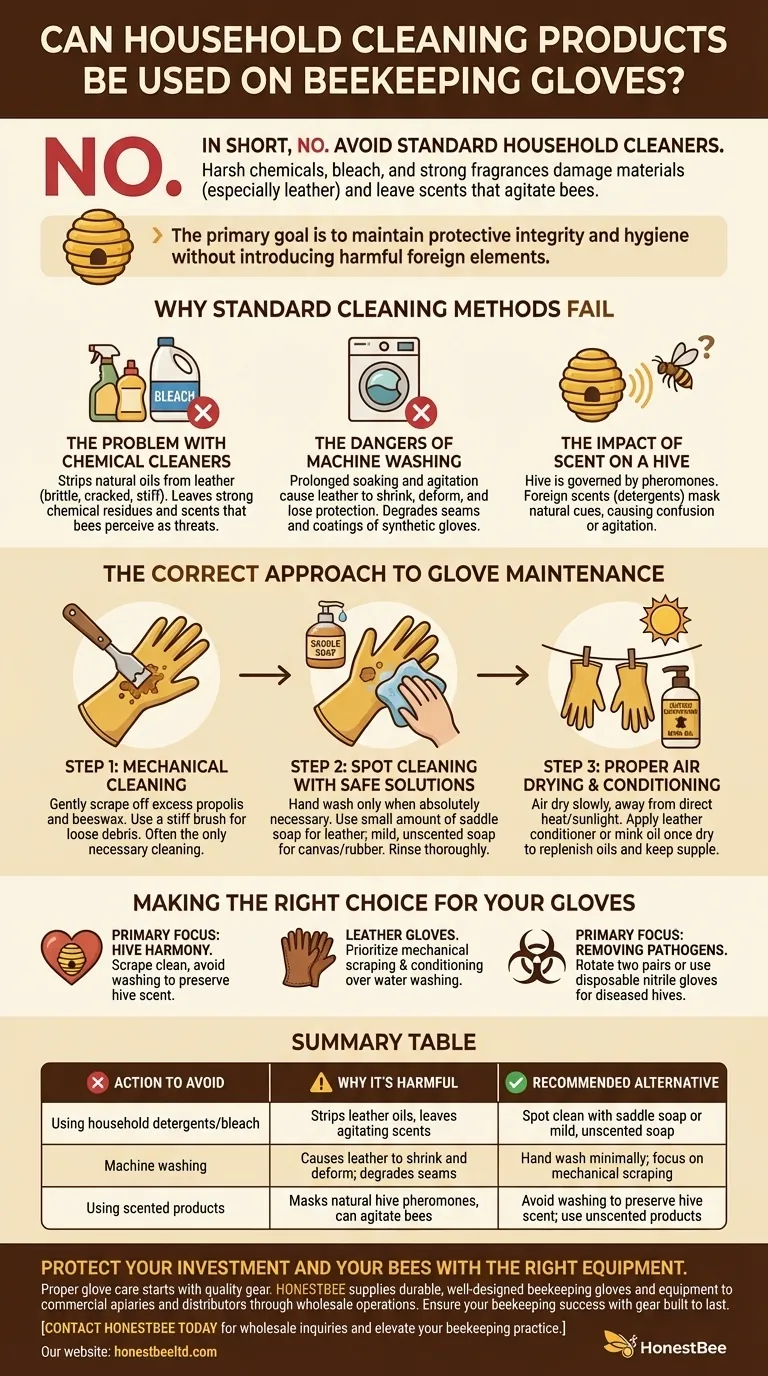
Related Products
- Beekeeping Gloves Goatskin Leather with Long Cotton Sleeve for Beekeepers
- Goatskin Leather Beekeeper Gloves with Vent Long Sleeve for Beekeeping Honey Bee Sting Proof Protection
- Premium Ventilated Goatskin Beekeeping Gloves with Full 3-Layer Mesh Sleeve
- Goat Skin Leather Bee Sting Proof Beekeeping Gloves with Canvas Sleeve
- Professional Galvanized Hive Strap with Secure Locking Buckle for Beekeeping
People Also Ask
- What type of gloves are recommended for beekeeping? Find the Best Fit for Protection & Dexterity
- Why is it important to clean beekeeping gloves regularly? A Guide to Hive Health & Safety
- When might a beekeeper decide to work without gloves? Master Hive Finesse and Dexterity
- What factors should be considered when choosing beekeeping gloves? Balance Protection and Dexterity for Your Apiary
- For which types of leather is beekeeping glove care applicable? Universal Maintenance for Goat, Pig, Cow & Deer Skin
- What are the key factors to consider when selecting gloves for beekeeping? Balance Protection and Dexterity
- What are the differences between cow leather and goat leather for beekeeping gloves? Protection vs. Dexterity
- Why is regular maintenance necessary for leather beekeeping gloves? Extend Gear Life & Precision in Commercial Apiaries

